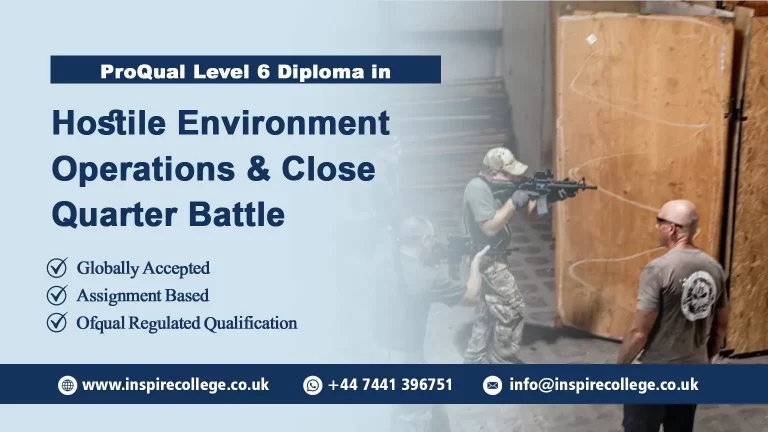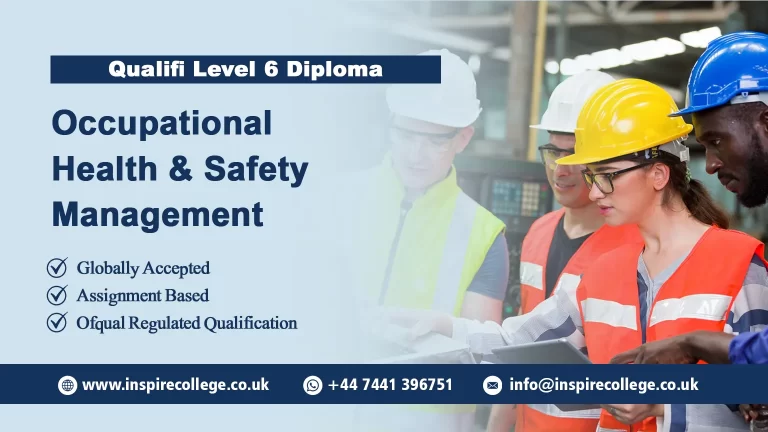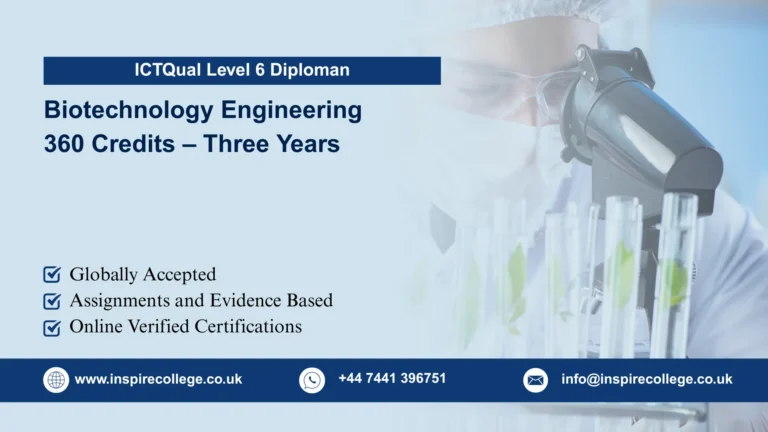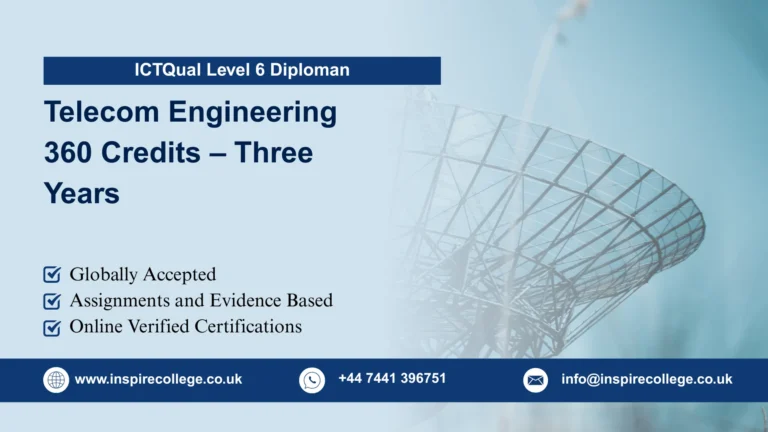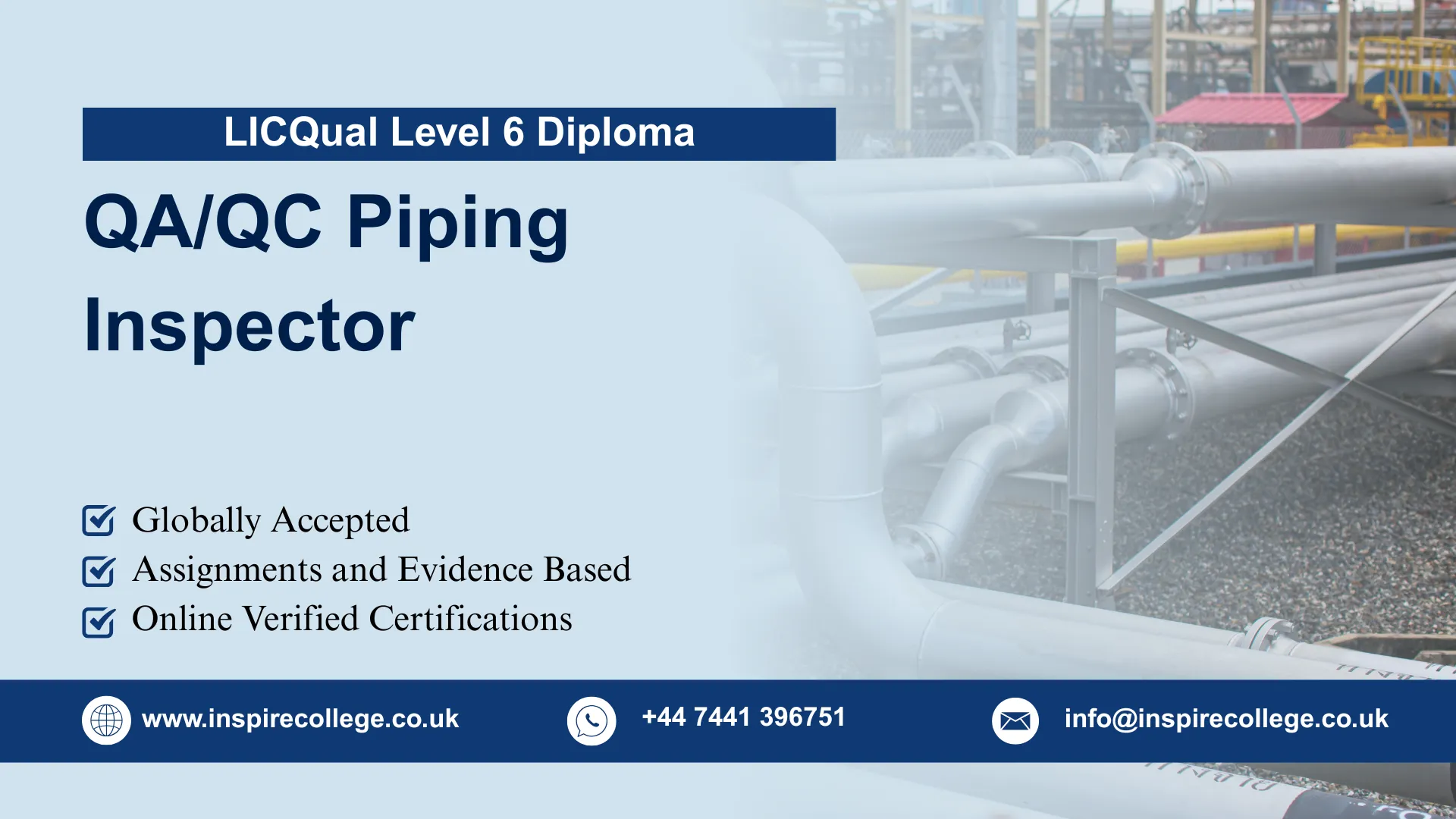
LICQual Level 6 Diploma in QA/QC Piping Inspector
The LICQual Level 6 Diploma in QA/QC Piping Inspector is a globally recognized qualification designed for professionals aiming to excel in quality assurance and quality control within the piping industry. With industries such as oil and gas, petrochemicals, construction, and power generation demanding higher standards of safety, compliance, and reliability, skilled QA/QC piping inspectors play a crucial role in ensuring that projects meet international quality benchmarks. LICQual Level 6 Diploma in QA/QC Piping Inspector provides advanced knowledge and practical expertise, preparing learners for senior technical and managerial roles in inspection and quality management.
The purpose of LICQual Level 6 Diploma in QA/QC Piping Inspector is to equip learners with in-depth understanding of piping systems, international codes and standards (ASME, API, ASTM, ISO), advanced welding processes, and non-destructive testing (NDT) techniques. Participants will also develop expertise in inspection procedures, pressure testing, integrity verification, and quality documentation, enabling them to effectively oversee and manage QA/QC operations in complex industrial projects.
By enrolling in LICQual Level 6 Diploma in QA/QC Piping Inspector, learners will acquire the ability to interpret and implement quality standards, supervise inspection teams, and contribute to risk management and compliance strategies. LICQual Level 6 Diploma in QA/QC Piping Inspector also emphasizes leadership and decision-making skills, ensuring graduates are prepared to take on roles such as senior QA/QC inspectors, quality managers, or project quality coordinators.
With its combination of theoretical knowledge and practical application, the LICQual Level 6 Diploma in QA/QC Piping Inspector not only enhances professional competence but also increases employability in global markets where advanced quality assurance skills are in high demand.
To enroll in the LICQual Level 6 Diploma in QA/QC Piping Inspector, applicants are expected to meet specific eligibility criteria to ensure they are adequately prepared for the academic and professional demands of the program. These requirements are designed to maintain high learning standards while allowing candidates with the appropriate qualifications and industry background to progress effectively in their careers.
Age Requirement
All applicants must be at least 20 years of age at the time of enrollment. This ensures that candidates have reached a level of personal and professional maturity necessary for advanced study and the responsibilities associated with QA/QC roles in the piping and engineering industries.
Educational Requirements
Applicants are required to hold a Level 5 qualification, diploma, or an equivalent certification in a relevant field such as Mechanical Engineering, Piping Engineering, Welding Technology, or Quality Assurance/Quality Control. Candidates who possess a bachelor’s degree (or equivalent international qualification) in engineering, industrial technology, or another technical discipline are also eligible. These academic foundations are essential, as the course covers advanced concepts in codes, standards, inspection techniques, and project quality management.
Industry Experience
To ensure practical readiness, candidates should ideally have a minimum of 2 to 3 years of professional experience within the industry. Suitable backgrounds include roles in piping inspection, welding inspection, fabrication supervision, quality assurance, or project quality control. Such prior experience allows learners to apply theoretical knowledge to real-world situations, deepening their understanding of QA/QC practices in complex industrial environments.
English Language Proficiency
Since the program involves technical documentation, detailed inspection procedures, and assessment reports, applicants must demonstrate strong proficiency in English. Competence in reading, writing, and understanding technical language is vital for successfully engaging with the course material and meeting assessment requirements.
By meeting these entry requirements, learners will be well-prepared to gain maximum benefit from the LICQual Level 6 Diploma in QA/QC Piping Inspector, ultimately enhancing their expertise and advancing their career opportunities in local and international industries.
Mandatory Units
The LICQual Level 6 Diploma in QA/QC Piping Inspector, achieve the qualification candidates must achieve all of the mandatory units:
Mandatory Units
By the end of this course, learners will have developed advanced technical knowledge, analytical skills, and professional competencies necessary to perform high-level QA/QC responsibilities in piping inspection across diverse industries such as oil and gas, petrochemical, power generation, and construction. Each unit of the diploma is designed to provide both theoretical understanding and practical application, ensuring that graduates are fully prepared to meet international industry standards.
Unit 1: Advanced Piping Design, Materials, and Specifications
By the end of this unit, learners will be able to:
- Critically analyze complex piping designs by interpreting Process and Instrumentation Diagrams (P&IDs), isometric drawings, and engineering schematics.
- Select appropriate piping materials by assessing operational parameters such as temperature, pressure, and resistance to corrosion.
- Accurately interpret and apply advanced piping class specifications, engineering datasheets, and technical documentation.
- Evaluate the behavior of different materials under varying mechanical, thermal, and environmental conditions to ensure long-term reliability and safety.
Unit 2: International Standards and Regulatory Compliance
By the end of this unit, learners will be able to:
- Apply key international codes and standards, including ASME, API, ASTM, ISO, and NACE, within QA/QC inspection frameworks.
- Ensure compliance with both local and global regulatory requirements for industrial piping projects.
- Review and evaluate project documentation for alignment with engineering standards, contractual obligations, and quality benchmarks.
- Conduct detailed QA/QC compliance audits, identify potential gaps or risks, and recommend corrective measures to enhance quality management systems.
Unit 3: Welding Engineering and Procedure Qualification
By the end of this unit, learners will be able to:
- Demonstrate advanced knowledge of welding processes, metallurgy, and their applications in high-pressure piping systems.
- Review, verify, and develop Welding Procedure Specifications (WPS) and Procedure Qualification Records (PQR) in line with international codes.
- Detect, classify, and evaluate welding defects, and recommend suitable corrective or preventive actions.
- Supervise welding operations on-site, ensuring strict adherence to approved procedures, safety standards, and quality requirements.
Unit 4: Advanced Non-Destructive Testing (NDT) Methods
By the end of this unit, learners will be able to:
- Apply advanced non-destructive testing techniques such as Time of Flight Diffraction (TOFD), Phased Array Ultrasonic Testing (PAUT), and digital radiography in piping inspection.
- Accurately interpret complex NDT reports, determining acceptance or rejection of results in accordance with international quality codes.
- Select the most suitable NDT methods based on inspection objectives, material types, and project requirements.
- Organize and coordinate NDT activities, integrating inspection results into the overall QA/QC strategy for effective decision-making.
Unit 5: QA/QC Management Systems and Inspection Planning
By the end of this unit, learners will be able to:
- Design, implement, and monitor quality management systems customized for piping and industrial projects.
- Develop comprehensive Inspection and Test Plans (ITPs), detailed checklists, and project-specific QA procedures.
- Oversee the execution of inspections, ensuring proper documentation, traceability, and compliance with quality objectives.
- Lead QA/QC teams effectively, integrating inspection planning with overall project execution to achieve timely and efficient outcomes.
Unit 6: Pressure Testing, Commissioning, and Mechanical Completion
By the end of this unit, learners will be able to:
- Plan and execute hydrostatic and pneumatic pressure testing in strict accordance with industry codes and safety regulations.
- Identify, evaluate, and mitigate risks associated with pressure testing and mechanical completion activities.
- Supervise commissioning processes and final system completions for industrial piping networks.
- Prepare detailed technical documentation, including testing records, punch lists, and final inspection reports, ensuring smooth project handover to clients or stakeholders.
This structured approach ensures that graduates of the LICQual Level 6 Diploma in QA/QC Piping Inspector acquire not only theoretical expertise but also practical, job-ready skills that are directly applicable in international engineering and industrial projects.
The LICQual Level 6 Diploma in QA/QC Piping Inspector is specifically designed for mid-career and senior-level professionals who wish to expand their technical expertise and progress into leadership, supervisory, or managerial roles in the fields of piping inspection, quality assurance, and quality control. LICQual Level 6 Diploma in QA/QC Piping Inspector is suitable for individuals who already possess industry experience and are ready to take their careers to the next stage.
LICQual Level 6 Diploma in QA/QC Piping Inspector is ideal for:
- QA/QC Inspectors and Engineers who want to upgrade their skills, gain advanced knowledge of international standards, and move into senior or lead inspector positions.
- Piping Engineers, Welding Engineers, and Mechanical Supervisors aiming to strengthen their technical expertise in inspection practices, welding qualifications, and regulatory compliance.
- Project Managers, Site Engineers, and Construction Supervisors who are actively involved in fabrication, erection, commissioning, and maintenance of piping systems.
- NDT Technicians and QA/QC Coordinators who want to broaden their professional scope by learning advanced non-destructive testing methods, inspection planning, and QA documentation.
- Industry professionals in oil & gas, petrochemicals, power generation, energy, and infrastructure projects who are responsible for ensuring piping integrity, reliability, and quality compliance.
- Diploma or Degree holders in Mechanical, Petroleum, or Industrial Engineering with several years of field experience who want to specialize in piping QA/QC and gain global career opportunities.
LICQual Level 6 Diploma in QA/QC Piping Inspector is not only designed to sharpen technical knowledge but also to develop strong leadership, decision-making, and inspection management skills. Graduates will be equipped to lead QA/QC teams, implement inspection systems, manage compliance audits, and contribute to the successful execution of complex industrial projects worldwide.
Register Now
FAQs for LICQual Level 6 Diploma in QA/QC Piping Inspector

